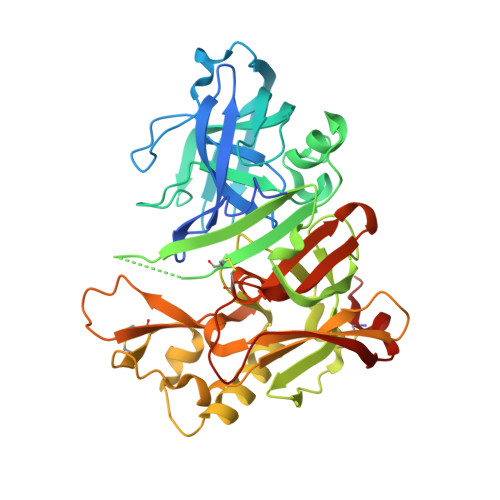Discovery of AM-6494: A Potent and Orally Efficacious beta-Site Amyloid Precursor Protein Cleaving Enzyme 1 (BACE1) Inhibitor with in Vivo Selectivity over BACE2.
Pettus, L.H., Bourbeau, M.P., Bradley, J., Bartberger, M.D., Chen, K., Hickman, D., Johnson, M., Liu, Q., Manning, J.R., Nanez, A., Siegmund, A.C., Wen, P.H., Whittington, D.A., Allen, J.R., Wood, S.(2020) J Med Chem 63: 2263-2281
- PubMed: 31589043
- DOI: https://doi.org/10.1021/acs.jmedchem.9b01034
- Primary Citation of Related Structures:
6PZ4 - PubMed Abstract:
β-Site amyloid precursor protein cleaving enzyme 1 (BACE1) is an aspartyl protease that plays a key role in the production of amyloid β (Aβ) in the brain and has been extensively pursued as a target for the treatment of Alzheimer's disease (AD). BACE2, an aspartyl protease that is structurally related to BACE1, has been recently reported to be involved in melanosome maturation and pigmentation. Herein, we describe the development of a series of cyclopropylthiazines as potent and orally efficacious BACE1 inhibitors. Lead optimization led to the identification of 20 , a molecule with biochemical IC 50 BACE2/BACE1 ratio of 47. Administration of 20 resulted in no skin/fur color change in a 13-day mouse hypopigmentation study and demonstrated robust and sustained reduction of CSF and brain Aβ 40 levels in rat and monkey pharmacodynamic models. On the basis of a compelling data package, 20 (AM-6494) was advanced to preclinical development.



















